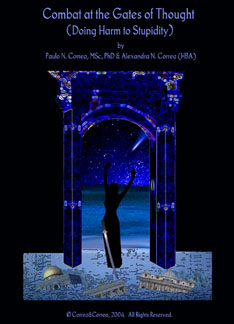![Akronos logo]](/images/akronos_wheel.jpg)
|
Akronos Publishing Concord, ON, Canada www.aetherometry.com |
![Akronos logo]](/images/akronos_wheel.jpg)
|
Akronos Publishing Concord, ON, Canada www.aetherometry.com |

Combat at the Gates of Thought (Doing Harm to Stupidity)
by Correa, Paulo N. & Correa, Alexandra N.
Published in July 2004. 44 pages.
Philosophy of Science & the Politics of Thought
Monograph AS1-07
Price: US $25 ($20 ISFA)
|
ABSTRACT
The combat between thought of the false (including truthful thought) and adequate thought (or thought of science) takes place at the gates of thought itself, as thought strives to discover concepts adequate to the functions of nature and existence. It is not a struggle between Dark and Light - and it does not duplicate any struggle between Good and Evil or Truth and Error. It is, above all, a combat with a dual aspect - against stupidity and in favour of a scientific method of thought - but it can only acquire this duplicity if its politics are those of Life and the living. So, it is also - and indissociably so - a political combat. The function of a concept and the concept of a function are already implicated in a relation of force and adequacy that subtends the 'problem of energy'. In fact - with the exception perhaps of Maxwell's demon - the partial observers that have been posited as 'ideal' depend strictly upon concepts rather than upon actual or empirical functions: Einstein's observer depends on the Lorentz-Fitzgerald transformation, which is a concept of Space and Time before it is a function (the concept is that Time is a line equivalent to a distance; this assumption is what permitted Einstein's concept of Space-Time); Heisenberg's observer depends on a probabilistic concept of chance (and chaos) as much as upon the concept of a Dirac-point particle (a concept notoriously devoid of any functionality whatsoever) for which probabilities of position, speed and momentum are calculated. Which brings us to Reich's question - to what extent are ideal scientific observers the product of the 'character structure' of the 'philosophical persona or personae' of the scientist? |